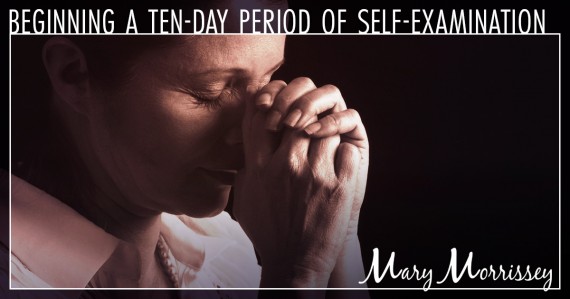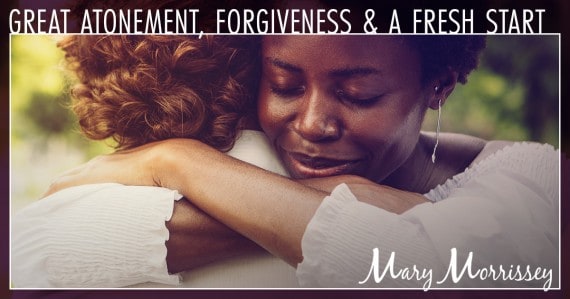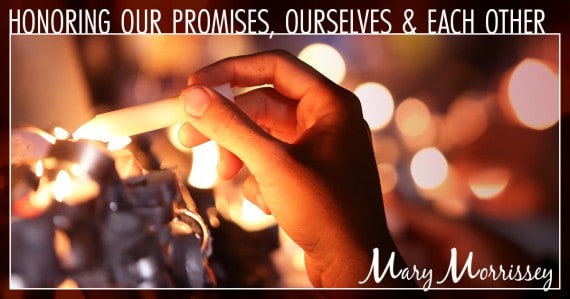What the Jewish New Year Can Teach Us About Honoring Our Promises, Ourselves and Each Other
SEPTEMBER 5, 2018
Whether You’re Jewish or Not, this Holiday Offers a Wonderful Opportunity to Examine the Promises and Commitments We’ve Made, Including the Unfulfilled Ones that May Be Energy Leaks In our Lives
Have you ever made a promise that sounded like any of the following:
Many people struggle with keeping promises and agreements like the ones above, and others we make in our daily lives.
It’s not that we don’t want to keep our word, often we just forget, or life gets in the way!
As a result, we can end up with a string of broken promises if we’re not mindful.
And while changing our minds from time to time when circumstances prevent us from keeping a promise is just part of being flexible in life, I’ve found that one holiday in particular offers us a unique opportunity to focus on following through on our commitments.
Rosh Hashanah is the Jewish New Year, which marks the beginning of a ten-day period of prayer, self-examination and repentance.
It’s a time for us to pause and examine the agreements and contracts you’ve made with yourself and others.

Words flow around us all day long and sometimes are taken lightly. Promises, commitments and agreements can be made easily, but keeping them is often another matter.
Adults might make promises to children about what they can have in the future, or children make may promises to adults about behaving better, for example.
Then there are legal contracts, promises to pay money, agreements to spend time, and perhaps commitments to live into your marriage in a particular way.
When you keep a promise, you are communicating to the other person that you value him or her. This can result in building trust in your relationships.
More importantly, by keeping a promise, you are telling yourself that you value your own word. Keeping a promise to yourself is the same as respecting yourself and eventually, promises kept can increase your self-esteem, confidence and heighten your experience of life.
Unfulfilled promises, agreements and commitments can create leaks of energy in your life
Although your conscious mind may not remember all of the major and minor agreements you’ve made in the past, your subconscious mind most certainly does.

For example: Maybe you’ve told yourself over and over again you’re going to clean the garage. Every time you pass the door to the garage or walk in the garage, you’re reminded that you haven’t cleaned it out yet.
Now, even when you think about cleaning the garage, you may feel energy draining out of you.
This feeling of decreased energy, vitality and aliveness can begin to build because your subconscious mind is busy trying to get you to fulfill on your incomplete promise.
By spending time reflecting on and renegotiating the promises, agreements and commitments you’ve made but not kept, you can increase your energy, leading to more productivity, effectiveness and well-being.
Yom Kippur is the day of the great atonement, forgiveness and a fresh, new start
Yom Kippur is the holiest day of the year in Judaism and the last day of Rosh Hashanah. It’s also known as the day of atonement, or, as I like to say, the day of at-one-ment.

When you deliberately set aside ten days to self reflect, you’ll most likely feel very at peace with yourself. For all the places you’ve let yourself down or others down, you can forgive yourself.
You’ve done your best job during those ten days, and now you can give yourself a fresh start and be ready for a new year to grow into who you’d love to be.
Give yourself a new opportunity to lean into being the person you’ve wanted to be in your life over the past year
Rosh Hashanah is an ancient tradition that anyone can practice and benefit from, whether you’re Jewish or not.

As Rosh Hashanah approaches and you start to make your Jewish New Year’s resolutions, you can begin by thinking about promises you can make to yourself that will propel you toward your goals and dreams.
To start, I’d recommend making small promises that you know you can accomplish in a short amount of time. When you follow through on smaller promises, you can develop a pattern of consistency that will enable you to follow through on bigger promises.
Keeping your promises to yourself can empower you to change and grow. It can also increase your self-esteem, build your character and prove to yourself that what you say and do is valuable and worthy of creating the life you’d love living.
And now, here’s a question for you in honor of Rosh Hashanah…
Is there any area of your life where you find it relatively easy to make promises and more challenging to keep them?
Exploring this question will help to clarify what’s most important to you in life so you can live and work according to your deepest values. I invite you to leave your reflections in the comments below.
Whatever our experiences may be in life, by sharing them we can help others grow, and we can expand and evolve ourselves by hearing from others, too.
So go ahead and leave a comment below, and join the conversation!
Source: Mary Morrissey
SEPTEMBER 5, 2018
Whether You’re Jewish or Not, this Holiday Offers a Wonderful Opportunity to Examine the Promises and Commitments We’ve Made, Including the Unfulfilled Ones that May Be Energy Leaks In our Lives
Have you ever made a promise that sounded like any of the following:
- “I’ll call you in a few days.”
- “I can finish that project by next week.”
- “I’ll meet you this weekend for lunch.”
- “I’ll pay you back tomorrow.”
Many people struggle with keeping promises and agreements like the ones above, and others we make in our daily lives.
It’s not that we don’t want to keep our word, often we just forget, or life gets in the way!
As a result, we can end up with a string of broken promises if we’re not mindful.
Over the past 40 years, I’ve had the honor and privilege of studying the principles and practices of many great religions, ancient philosophies, modern science and psychology.Adult friendship = 2 people saying "I haven't seen you in forever! We should really hang out more" over and over again until one of you dies— Lyndsey Gallant (@apocalynds) July 23, 2017
And while changing our minds from time to time when circumstances prevent us from keeping a promise is just part of being flexible in life, I’ve found that one holiday in particular offers us a unique opportunity to focus on following through on our commitments.
Rosh Hashanah is the Jewish New Year, which marks the beginning of a ten-day period of prayer, self-examination and repentance.
It’s a time for us to pause and examine the agreements and contracts you’ve made with yourself and others.

Words flow around us all day long and sometimes are taken lightly. Promises, commitments and agreements can be made easily, but keeping them is often another matter.
Adults might make promises to children about what they can have in the future, or children make may promises to adults about behaving better, for example.
Then there are legal contracts, promises to pay money, agreements to spend time, and perhaps commitments to live into your marriage in a particular way.
When you keep a promise, you are communicating to the other person that you value him or her. This can result in building trust in your relationships.
More importantly, by keeping a promise, you are telling yourself that you value your own word. Keeping a promise to yourself is the same as respecting yourself and eventually, promises kept can increase your self-esteem, confidence and heighten your experience of life.
Unfulfilled promises, agreements and commitments can create leaks of energy in your life
Although your conscious mind may not remember all of the major and minor agreements you’ve made in the past, your subconscious mind most certainly does.

For example: Maybe you’ve told yourself over and over again you’re going to clean the garage. Every time you pass the door to the garage or walk in the garage, you’re reminded that you haven’t cleaned it out yet.
Now, even when you think about cleaning the garage, you may feel energy draining out of you.
This feeling of decreased energy, vitality and aliveness can begin to build because your subconscious mind is busy trying to get you to fulfill on your incomplete promise.
By spending time reflecting on and renegotiating the promises, agreements and commitments you’ve made but not kept, you can increase your energy, leading to more productivity, effectiveness and well-being.
Yom Kippur is the day of the great atonement, forgiveness and a fresh, new start
Yom Kippur is the holiest day of the year in Judaism and the last day of Rosh Hashanah. It’s also known as the day of atonement, or, as I like to say, the day of at-one-ment.

When you deliberately set aside ten days to self reflect, you’ll most likely feel very at peace with yourself. For all the places you’ve let yourself down or others down, you can forgive yourself.
You’ve done your best job during those ten days, and now you can give yourself a fresh start and be ready for a new year to grow into who you’d love to be.
Give yourself a new opportunity to lean into being the person you’ve wanted to be in your life over the past year
Rosh Hashanah is an ancient tradition that anyone can practice and benefit from, whether you’re Jewish or not.

As Rosh Hashanah approaches and you start to make your Jewish New Year’s resolutions, you can begin by thinking about promises you can make to yourself that will propel you toward your goals and dreams.
To start, I’d recommend making small promises that you know you can accomplish in a short amount of time. When you follow through on smaller promises, you can develop a pattern of consistency that will enable you to follow through on bigger promises.
Keeping your promises to yourself can empower you to change and grow. It can also increase your self-esteem, build your character and prove to yourself that what you say and do is valuable and worthy of creating the life you’d love living.
And now, here’s a question for you in honor of Rosh Hashanah…
Is there any area of your life where you find it relatively easy to make promises and more challenging to keep them?
Exploring this question will help to clarify what’s most important to you in life so you can live and work according to your deepest values. I invite you to leave your reflections in the comments below.
Whatever our experiences may be in life, by sharing them we can help others grow, and we can expand and evolve ourselves by hearing from others, too.
So go ahead and leave a comment below, and join the conversation!
Source: Mary Morrissey
Honoring Our Promises, Ourselves and Each Other | Mary Morrissey
 Reviewed by TerraZetzz
on
9/05/2018 08:28:00 PM
Rating:
Reviewed by TerraZetzz
on
9/05/2018 08:28:00 PM
Rating:
 Reviewed by TerraZetzz
on
9/05/2018 08:28:00 PM
Rating:
Reviewed by TerraZetzz
on
9/05/2018 08:28:00 PM
Rating:



